|
SPEARPOINT
Part Two
by
Stan Goff
Military/ Veterans Affairs Editor
© Copyright 2006, From The Wilderness Publications, www.fromthewilderness.com. All Rights Reserved. This story may NOT be posted on any Internet web site without express written permission. Contact admin@copvcia.com. May be circulated, distributed or transmitted for non-profit purposes only.
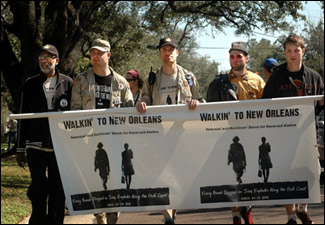
Walking through Mobile
April 21, 2006 1430 PST – (FTW) - We arrived at Mobile’s Veterans Memorial Park in about three hours, and Grumble had hooked us up with sack lunches—peanut-butter and jelly sandwiches, red-meat oranges (the sweetest I’d ever tasted), and homemade trail mix. It was relatively cool, so no one seemed excessively dehydrated, though the blisters had already begun. Jose Vasquez, our chief medic, was already hawking moleskin and using insulin syringes to draw the fluid off of them. Spirits were very high.
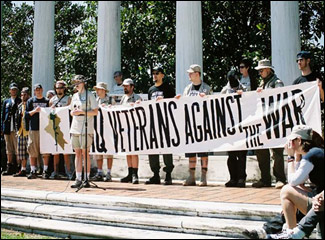
(Ex-Sergeant) Kelly Dougherty, IVAW,
Veterans Memorial Park. Mobile AL
The unexpected reactions, and the unexpected more generally, were deeply significant. There was fear too, related to the perceptions and expectations of locals further down the road—especially at the Mississippi Vietnam Veterans Memorial in Ocean Springs, MS. Black folk thereabouts control one, and only one, institution: the church. There are a host of good reasons for these churches, especially when parishioners are in such dire straits as after the hurricane—even more vulnerable to the depredations and pressures of the white elites than usual—to feel compelled to avoid anything that appears to be confrontational.
Marchers were afraid that we would be ill-received in the Deep South. Locals were afraid that we might bring in an attitude that aroused hostility. Fear feeds the imagination, and the imagination, in turn, feeds fear. But the real world, with its light and substance, pushes aside l’imaginaire. Both elements would learn to lose their fear. Intangible as this may seem, it may have been one of the most important aspects of the march—the essence of turning that corner we had only dimly conceived in the planning. And the unplanned parts of the action, the unexpected, and even the inconvenient, would turn up some of the most remarkable experiences we had.
We were learning to make an ally of chaos. We would learn tactical agility…improvisation. We weren’t writing a symphony. We were playing jazz.
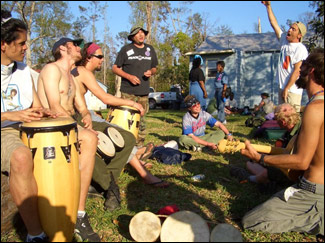
Jam session in Slidell, LA – 3 Iraq vets,
2 Vietnam vets, a local musician, and a filmmaker
At Veterans Memorial Park, we were joined by local young people—African American—those under the tutelage of Reverend Kenny Glasgow, a stout scarred ex-con turned street preacher, who provided us with a slam poet and young women who carried signs calling attention to the prison system.
Prison is a key mechanism of social control employed down there against Black folk, and felony disfranchisement is the new Jim Crow vote-rigging. Paul Robinson, one of the main march organizers, was focused primarily on felony disfranchisement before Hurricane Katrina. He quotes the grim statistics as readily as he can tell you his name. Alabama prisons operating at 200% of their capacity, mostly to incarcerate low-level drug offenders. Almost a quarter million Alabamans now stripped of the right to vote because of prior felony convictions…after the sentence is served, they’re mostly felonies that are non-violent, and overwhelmingly targeting Blacks.
Felony disfranchisement is at work in all three states through which we march. When combined with white bloc voting, and the gerrymandering of districts to ensure Black minorities, this is a key strategy in retaining the Southern states as Republican strongholds. While white progressives in the north have focused on Diebold voting systems, they have largely missed this spitefully racist mechanism in operation in the Deep South.
And one has to look hard among the prison population here to find the white inmates. They are a tiny minority within the prison population. The mass of black bodies held in these overcrowded lockdowns serve as a reminder to the general African American population—just as Abu Ghraib and Bucca in Iraq serve as a warning—of who is really in charge. Until white progressives move this issue of prisons to the top of their political priorities, there can never be any deep solidarity or working reciprocity with African America.
This is a crisis that consumes the majority of Black families in the US, and white liberals for the most part have been AWOL. Yet it is precisely here where the system is exposed in its most naked brutality, with its guns, its manacles, its fetid cells, and the direct exercise of colonization—population control through violent intimidation…from Iraq to Palestine to the Black Belt of the US. In connecting Katrina to the war, we tore the curtain of a piece of the system. In connecting Angola Penitentiary to Abu Ghraib, we can tear that curtain down even further.
But we have to come out of our comfort zones. White folks have to get to know Black folks, and not just those Black folks who make us feel comfortable through their own assimilation. African America is a different society, a different nation, from white USA.
That’s why it was important that we had southern African Americans host us for the first three nights of the march.
Mamie Mackey, whose son is a Sergeant First Class in the Army Reserve, and who spoke against the war with us at Veterans Memorial Park, has a house with 12 acres in Bayou LeBatre AL. She runs a group home for developmentally disabled adults in her own house, which still had blue plastic over the roof. This is where we pitched our first camp.
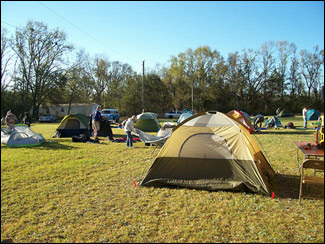
Mamie Mackey’s place—Camp One
On one side of Three-Mile Road, where Ms. Mackey lives, there are white residents. On the other, the residents are Black. The insurance adjusters came in after the hurricane and treated the Black residents as if they were all out to skin the insurance companies. Blue tarps still cover most of the roofs on the Black side of the road. On the white side, there are nothing but new roofs to compliment the shiny bass boats in the driveways.
Welcome to the New South.
Ms. Mackey and her son went to their church down the road to enlist people who would describe their experience with the hurricane, the insurance companies, and the government.
That evening, when we had moved in an occupied her land with a tent city, five survivors sat like an outdoor panel before us, and their stories came pouring out of them. Since the hurricane had happened, this was the first time anyone had come from the outside and paid attention. A hundred people sat quietly and heard these stories.
Three of these women, all over 60, were so moved by this simple act that they would follow us across the Gulf Coast until we arrived at New Orleans. One woman, T.T., approached me at the Slidell camp two days later. She had tears in her eyes.
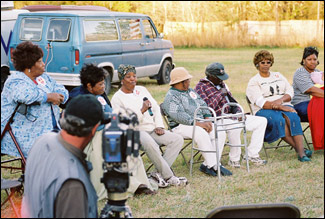
Bayou LeBatre Survivors Speak-out
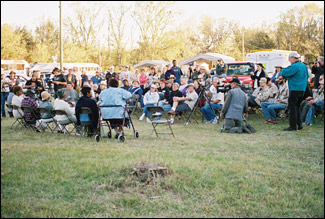
Listening – A revolutionary act
“I don’t know if I can stay with you to the end,” she said. “I don’t know if I can say goodbye t’ y’all. I don’t want this to end.” Her hand fluttered up and touched my cheek as she blinked back the tears. “In six months,” she said, “this is the first time I feel like someone got my back.”
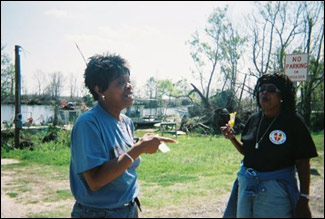
T.T. and Nancy, from Bayou LeBatre, marching
toward East New Orleans on HWY 90
Scott Aaseng, from the American Friends Service Committee (AFSC) in Chicago, had picked up Scott Schmelling, a hitchhiker from Pennsylvania, in their Eyes Wide Open van. He was working his way down to the Gulf to help…purely on his own. Schmelling is a short, stout white guy, like someone you might meet on a pipeline crew or a cowboy bar. This unexpected meeting between him and the AFSC members was fated.
Dennis O’Neill, a postal worker on the Advance Team, wrote in his march journal:
“I met Scott Schmelling the morning of Monday, the 12th, when only a handful of us were at the Saving Our Selves (SOS) relief warehouse in Mobile, preparing for the next day's kickoff leg of Marchin' to New Orleans. He's a short, solid dude, with a working stiff's hands. He's what this culture calls white, though his real skin is roughened and reddened by time spent outside.
“His arrival was a fluke. He'd hitch-hiked out of Lancaster, PA looking to work rebuilding the Gulf Coast. He first heard about the March from the drivers of his fourth ride, a van stuffed with name-tagged combat boots and civilian shoes. (For those who haven't seen it, this is Eyes Wide Open, an exhibit which uses displays of footgear to bring home to people in this country the reality behind statistics like 2,309 dead troops or news bites that start "Just hours ago, a blast killed at least 22 people in Baghdad...")
“’Count me in’ was Scott's response. Though he knew not a soul on the March and was neither a veteran nor kin to a serving troop, he fit seamlessly into our expanding crew. He walked mile after mile without complaint, worked hard when there was work to be done, partied hard when that was on the agenda, and went skinny dipping in Bayou Liberty after dark despite the signs warning of alligators.
“Best of all, in the middle of our trek, Scott came up with a black marker and started having the rest of us sign his official March tee shirt. And I do mean everyone—from Katrina survivors we met en route to Cindy Sheehan, from WW2 vet Gene Glazer to Grumble, our chief cook and bottle washer. I have no idea where folks squeezed the last few names on.
“During the closing rally in Louis Armstrong Park earlier today, Scott bounced onto the stage and auctioned off that tee shirt. He raked in $2000! People are starting to recognize that our March has made history, real history, and they want a tangible piece of it. Scott took his two grand and split it down the middle—$1000 to SOS and $1000 to Common Ground, a NOLA-based relief outfit. After the rally, he jumped in a car going to Mobile to work with SOS.”
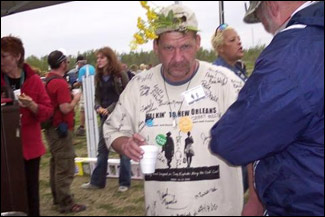
Scott models t-shirt and flowers (he mostly smiles)
Scott was enlisting fellow workers at the end of the march for his first project: fixing Mamie Mackey’s roof.
Elliott Adams had enlisted Michael Cuzzort (IVAW from New Orleans), and marchers Shirley Young and Charlie Orrock to run the mad circuits back and forth to New Orleans and Mobile to pick up late arrivals from the airports and bus stations. This spirit of unhesitatingly volunteering was—more than anything else—responsible for the logistical success of the march. Many on the march remarked at how organized the march seemed, not seeing the red-eyed chaos we were swimming in behind the scenes. The organizers got all the credit, but deserved only some of it. It was this spirit of cooperation and selflessness that made good things happen and bad things mere nuisances.
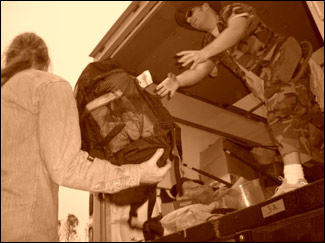
As new arrivals came, those who knew them embraced them. Hugging, hand-holding, shoulder-rubbing, and arm-in-arm walking characterized the whole march. There was an erotic connection, but erotic in the sense that Audre Lorde described—not that commodified, genitalized, reductive sense of a post-Calvinist consumer society, but what Lorde described as the combination of material and psychic connection to one’s world. Energy…life force…Dylan Thomas called it the force that through the green fuse drives the flower. Sensual, but not manipulative. Not on the make. Males did not pull back from physical contact with other men, and there was never the sense that they were objectifying the women on the march.
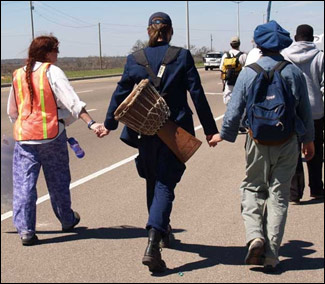
Minnie-Bruce Pratt, an LGBT activist who hails from Alabama, mentioned to me on the side that she was pleasantly surprised by how the male veterans, young and old, seemed to be consciously and self-critically struggling against gendered power…at how the male Iraq vets were “scrupulously” respectful of their female peers, both in the sense of not coming at them with sexual agendas, but also in sharing social space with them as equals.
This was probably the least homophobic collection of veterans one might find anywhere, and openly gay members of both VFP and IVAW knew they were safe there.
Day Two – We will pass through Pascagoula on the first leg of today’s trip. Home of the Pascagoula Naval Shipyard, run by Northrup-Grumman…home of Trent Lott, the most Klan-friendly member of the US Senate since Jesse Helms stepped down.
This is taking it to them. Too bad the trade union movement doesn’t get this yet. You don’t demonstrate an offensive spirit by hiding behind the battlements of an ancient fortress while your enemies lay siege to you. You take your battle to them, where they live. We are General Sherman, but without the guns and torches. Instead of driving toward the strategic railheads of Atlanta, we are driving into the redoubts of poverty and racial-national oppression to organize support for an insurgency.
Don’t think they didn’t notice. Don’t think they didn’t get the symbolism either. We walked over big bridges. We were bridge-builders, breaching their trench-lines.
This was a rich day, in action and symbol. We had taken nourishment from our first night—when it became unseasonably cold, and we rose on the land of our new friends, sipped at Grumble’s steaming cowboy coffee, and shooed the chill away with groggy laughter. Merely leaving a tent forced us to place our bare palms on the land. Stars were chased off by the dawn before our eyes, unconcealed by the enclosure of houses. We were starting to sense our strength, moving out here to the margins of the grid.
We looked out over Ms Mackey’s open field, and there was a little city there of multi-colored nylon peaks and domes. We were carnies of the revolution, pitching and breaking camps through the battlespace of Katrina’s aftermath.
At 9 AM, by some miracle, we were prepared to move, and we blocked the two lanes of road in front of Ms. Mackey’s house to wave out the convoy. Back to Highway 90, where we would cross the state line into Mississippi, dismount and walk, beginning at the Singing River Hospital in Pascagoula.
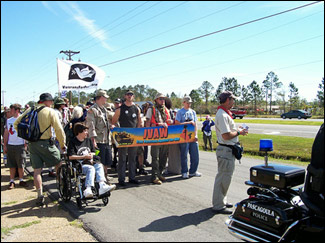
Preparing to move out on Day Two
– “IVAW, front and center!”
Even more than the first day, we were surprised by the overwhelming majority of responses to our march and our banners being positive. Even shipyard workers, dependent on the military-industrial complex for their livelihoods, were raising peace sings at us. Truck drivers again. Perhaps the most well-received by the marchers, however, were school buses full of Black kids, who thrust themselves raucously out the windows to shout support and wave peace sings and closed fists of solidarity.
One marcher counted the supporting responses and the opposition that passed on the highway. He said the ratio was almost 20 to one in support. So while some sterile poll tells a quantitative story of mass delusion, this interaction on the highway told us something about passion and engagement that was very encouraging.
If the antiwar movement is seen as a spear, then in a period of intense militarism the veterans and military families must be seen as a spearhead. The Iraq vets, then, are the point of the spearhead. We need the weight and stability of the whole spear, shaft and all, to send it on its way and pierce the heart of war and injustice. But the point must be sharp, and it must arrive at the forefront of this throw.
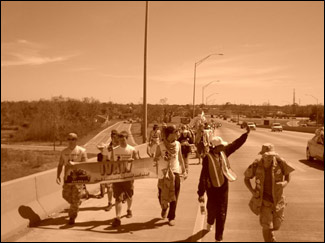
Vivian and IVAW lead us across the
Pascagoula River Bridge, near Trent Lott’s
home – Vivian waves to a horn-honking supporter
We stopped for lunch in the midday sun at Gautier, MS, in an open parking lot before a gutted store front, parking the buses to afford us a modicum of shade. Grumble had come up short-handed at the camp and ran late. Jamie Branigan had come with a pickup truck and a 17’ trailer, and we set up the entire camp kitchen out of that.
I worried over a late lunch that after having walked eight miles people would get antsy and start complaining. We had not front-loaded enough water, either. The FM radios didn’t reach that far, and we were having problems with cell phones. But there was none of it…not a single complaint that I heard.
Jose treated blisters, while some IVAW folks launched into a spontaneous percussion session with their drums.
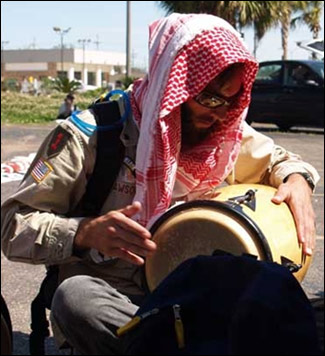
Josh Dawson, IVAW – Hawaii (stopped in Gautier, MS)
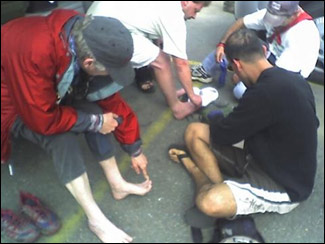
Jose works on Minnie-Bruce Pratt, while Stan
plays medic with Scott Schmelling
The lunch trailer sped past us, and Elliott and I leapt into a car to chase them down and lead them back.
Peanut-butter and jelly. Oranges. At least as good as filet mignon. As they say in Latin America, hambre es la salsa mejor. Hunger is the best sauce.
The next stop was the Mississippi Vietnam Veterans Memorial. This was a controversial stop during the march coordination phase. Paul and Vivian had to struggle hard with the fear-imagination circuits on this one. Local church leaders imagined this as something disrespectful to veterans and therefore incredibly provocative. Their local embeddedness, strong relationships, and wise diplomacy, however, paid off. We would go there, and the pastor of Macedonia Baptist Church—Reverend Jesse Trotter—in Ocean Springs, MS, would join us there before we attended the same church that evening.
At the Mississippi Vietnam Veterans Memorial, Ann Wright, our Event Coordinator for the march, met us with a bucket of carnations. Ann retired from the Army Reserves as a Lieutenant Colonel, and was a career diplomat. She resigned from her last Foreign Service post in protest against the Bush doctrine.
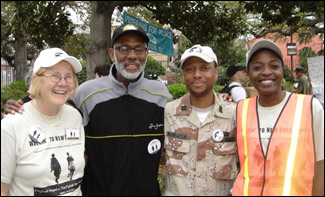
(L-R) Ann Wright, Paul Robinson, Michael
McPherson, Vivian Felts
We lined the Vietnam vets on one side and the Iraq vets on the other, and invited representative comments from each. The stop was dedicated to Douglas Barber, an Alabama native and Iraq vet who turned against the war before he turned a shotgun on himself after being treated late by the VA with a fistful of pills and no counseling.
The memorial is surrounded by a FEMA camp, where dozens of families live in tiny trailers that cost $90,000 each (another series of plum contracts), enough to rebuild two actual permanent homes.
We picked up flowers in a silent procession and entered a walled enclosure with the photos and names of Mississippi veterans who died in Vietnam, placing the flowers wherever each person felt right doing so. Audrey Mantey, a military family member from Detroit wrote of the event in her blog:
“When we arrived at the Vietnam memorial, the IVAW sign was set up, and the Iraq Veterans were asked to stand by it. Opposite them, the Veterans for Peace sign was set up, and the Vietnam Veterans stood under it, facing them. The Vietnam vets talked first, talking about the cost of that war, in human terms, about how they discovered that the only ones who would take care of them were each other…talked about the absence of the VA when they are most needed; the failure of government to take care of those whose lives they risk without a second thought, and the lives that have been lost not only in Iraq during action, but of those who came back, desperately pleading for help, only to be turned away by the VA. The Iraq vets, in turn, spoke about how they hoped that in another 30 years they would not be standing on the other side of that lawn, in the position of the Vietnam vets, talking to a new generation of veterans returning from war.
“We were asked to take a flower, and place it in the memorial where it felt appropriate. I'm not sure what I expected the memorial to look like, but I know I was not prepared for it to be filled with the photos of those who had died. No words.”
The silence was what did it. People started trailing tears across the brick floor and grasping one another for support.
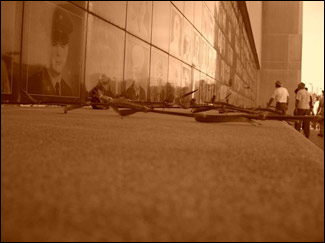
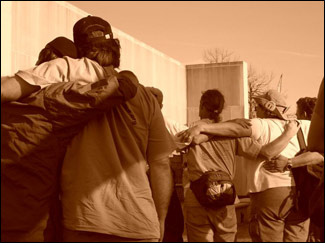
Victoria Cintra of the Mississippi Immigrant Rights Alliance (MIRA) had joined us with Hispano-Latina workers who survived the hurricane. While the hurricane didn’t discriminate, the government did afterward. None of the immigrants were eligible for an ounce of government aid, even though all paid income tax like anyone else with a job. These workers are facing extraordinary hostility from reactionary demagogues, and they are the newly favored targets of Klan appeals as well as Southern politicians who are well versed in how to split workers along racial and national lines.
We could not know at the time that only a week later, the Bush administration’s initiatives to basically enslave Hispano-Latina workers in the US would generate an explosive collection of mass demonstrations across the country, with over one million in Los Angeles alone. We listened to a lot of our march musicians covering old Bob Dylan tunes along the way.
A hard rain’s agonna fall.
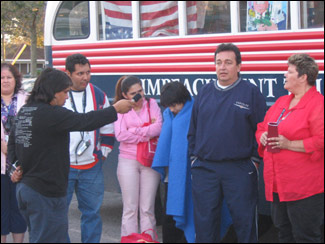
Victoria Cintra (far right) with immigrant worker families
That evening, we went to church, Reverend Trotter’s church.
Some of the Iraq vets and other young people said, “I don’t do religion,” and headed off to a local bar. The next day, we had a few discrete criticism/self-criticism sessions about white privilege. This was a learning process. And here is where I will take an editorial digression.
The Black church is far more than religion, and to make such a cavalier statement as “I don’t do religion” is not a moral failure; it is an unexamined exercise in white privilege.
Remember what I said earlier about territory? That soldiers fight for territory?
We walked, and that is why we knew the land, the homes—many shattered by wind and flood—that we were just beginning to help people defend. We have to understand the implications of this. We can become a Department of HOME-land Security for the oppressed, only we are talking about real homes and not some national-fascist fatherland abstraction.
This movement has struggled for some time with several questions. Why are we so white? Why do we have such minimal participation from black and brown? How do we reach out? How can we stop those in power from ignoring us?
We may have stumbled upon the answers to some of those questions by doing what we just did.
Those with some social privilege are always—historically—the people who have the educational, financial, socio-cultural, and organizational advantages available to them to be more effective when they are politically radicalized. When movements are organized around issues like the war and foreign policy, those in the best position to struggle around these global issues are those who are less preoccupied with more immediate issues of survival for themselves and their families. So the privileges of class, race-nationality, and gender are reflected in the very movements that have declared themselves against exploitative power.
In many cases, these movements also reflect a kind of myopia. We have missed the struggles that are going on all around us, precisely because we have a degree of citizenship…we are listened to and taken seriously by the establishment. The struggles we have missed are those that affect those who are treated as less-than-citizens…be they African Americans, Hispano-Latinas, or Indigenous Nations…women, LGBT, young people.
We must grasp the difference between a citizen and a subject, because this is the difference between colonizer and colonized. And that colonial status breaks down when the citizen converts the privileges of citizenship into resistance by placing that privilege in the service of the subjects...of the subjugated. We turn the class privilege into a weapon against class. We turn the privileges of men against male supremacy, and heterosexual normacy against oppressive sexual norms. We turn the privileges of whiteness against white supremacy. We turn the valorization of the military in a militarized society against militarism. We turn territorial privilege into a weapon to regain the lost territory of the subject...and we redefine citizenship in a new country, in liberated territory, figurative and literal.
We went to the Gulf Coast and we connected the war abroad with a war at home. Let’s think about what we mean when we say “war at home.” What does it look like, this war? Who is this war aimed against? How is it fought? These are the things we need to know in order to fight back.
In both Iraq and the Gulf Coast, brown, foreign, and poor people have been subjected to at least two perfectly similar assaults: the attempt to take their territory, and the attempt to impose control over them as a population.
In our trip across the Gulf Coast, we took a couple of important first steps to deal with the questions raised above. We went to the heart of the nation’s Black Belt. We accepted Black leadership, male and female. We shared resources with African American organizers on their home bases. We met with and formed relationships with everyday Black, Native Nations, Hispano-Latina, Vietnamese, and poor white people in the region.

Please Note
This function has been disabled.
|
|
|
|



